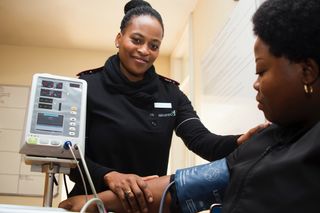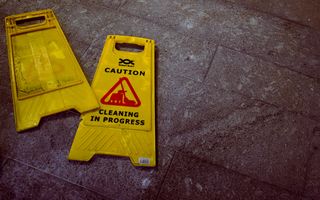
The novel coronavirus hit the United States in February of 2020 and is causing coronavirus disease 2019 (COVID-19). COVID-19 is not the same as the coronaviruses that commonly circulate among humans and cause mild illness, like the common cold. COVID-19, if not treated, can lead to severe illness or death, and it is spreading rapidly throughout every community in the country.
As of April 12, 2020, the United States had over 500,000 cases and over 20,000 deaths, the largest in the world. COVID-19 has shut down the country. Many Americans are now at home sheltering in place, in an effort to reduce the spread of the virus. While the virus itself is devastating communities, that is not the crisis. The crisis of epic proportions is how COVID-19 will decimate poor people.
In less than a month, the United States has gone from having one of the best job markets in history to one of the worst since the great depression. According to the Department of Labor, in the last week of March, 3.3 million people had filed jobless claims. During the first week in April, an additional 6.6 million claims came in, making the current total at 16 million claims and rising. It is estimated that this is the beginning of the largest job loss the United States has ever faced and will pale in comparison to any numbers recorded during the great depression.
In putting America to work, this post explores the status of the changing workforce. It relates to psychology and the impact to careers, communities, and workplaces, and how all are connected to the mental and emotional space we share within and outside the workplace. Sharing information with readers on the changing face of the workforce is vital to raising levels of awareness for workers and companies. This post is unlike any I have ever written, as COVID-19 is shining a light on the economic inequalities that have always existed within the country.
Labor economist say this isn’t like anything they have seen in over a century. There is nothing to really compare this to. As the country has shut down economic activity to slow the virus, we are now faced with how we define essential workers and those who have lost all of their income.
The working poor are on the frontlines of the COVID-19 pandemic. Low-wage service workers are being devastated by this pandemic.
According to David Autor, a labor economist at MIT, “For the last two decades, service workers have become an increasingly large part of the labor force as many of the midlevel office and manufacturing jobs previously open to people without college degrees have dried up. It’s people in these service jobs, already low paid and often with few health and other benefits, who will struggle the most.”

For those of us who can shelter in place and work from home, this crisis is different and in some cases, a mild inconvenience. However, if you are one of the working poor, you are stocking shelves at the warehouses and grocery stores, you are unloading the truck at the local pharmacy, you are the certified nurse assistant (CNA) working in the nursing home, you are the farm worker picking the produce, you are the custodians sterilizing and cleaning the hospitals, airports, and train stations, you are the security guards ensuring that we engage in social distancing and you are driving the trucks across the country to deliver all of the goods we need to shelter in place.
If we are short on personal proactive equipment (PPE) for medical professionals, what are we providing to the working poor?
The social injustice that COVID-19 exposes is that even though poor people work, they are still barely able to survive and not make it out of poverty, and now every time they go to work they are at increased risk. So, they are within an inequitable dichotomy; they are either on the front lines of the pandemic with very little and in some cases no support, or they are the people losing their low-wage service jobs and poverty is literally killing them. According to David Rotman, “the people losing these low-wage service jobs were already experiencing skyrocketing mortality rates from what economists have begun calling “deaths of despair,” caused by alcoholism, drug abuse, and suicide.”
Congress passed and the President signed the Coronavirus Aid, Relief, and Economic Security Act (CARES), which established the Pandemic Unemployment Assistance to help provide a boost to unemployment, not incomes of those who have lost their jobs. The $2 trillion legislative package is meant to give those affected workers the means to weather the shutdown and help to restart the economy after COVID-19. However, it is unclear if the funds are enough and if they will get to those most in need in time.

We must do better for those on the front lines who go to work every day to keep essential functions operating. I know first-hand of the difficult choices poor people have to make. I was one of six raised by a single parent. I have a niece who works at an Amazon warehouse and a nephew who works in a pharmacy in Las Vegas. My niece goes to work with a mask, hand sanitizer, and a compromised immune system, but she is the only one working in her household of seven. My nephew lives paycheck-to-paycheck, and he must work to survive. My aunt is the director at a nursing home in a small rural town in the central valley of California. They work hard every day, and the disparities in the economy are amplified in a COVID-19 world as they take on risks daily to work and survive.
According to Marc Morial of the National Urban League, “Black workers are more likely to hold the kinds of jobs that you can't do from home. So African Americans and Hispanics may be more likely to be exposed to this virus.” The stress they endure will exacerbate their inequities. It is in the poor communities that you will also find large populations of people of color. They have large disparities in health care, little access to insurance and high levels of unemployment all raising the level of despair to one of a catastrophe.
I think the well-known Detroit writer, producer, and poet Jessica Care Moore said it best: “Somebody’s gotta tell them that we are not ghosts; that we are in this city and we are alive!”
I would like to dedicate this piece to all of the front-line workers who must work to support their families and those who are putting their own lives at risk. You are not ghosts. We see you. Please stay safe, stay sane, and stay healthy! We appreciate you and we thank you!
References
Aubrey, A. (April 13, 2020). National Public Radio (NPR). Who Is Most Vulnerable To COVID-19? And Other Questions Answered. https://www.npr.org/2020/04/13/833010438/who-is-most-vulnerable-to-covi…
Muro, M., Maxim, R. & Whiton, J. (March 17, 2020). The places a COVID-19 recession will likely hit hardest. The Metropolitan Policy Program at Brookings.
https://www.brookings.edu/blog/the-avenue/2020/03/17/the-places-a-covid…
Ogden, C. (May 23, 2012). We Are Not Ghosts. http://interactioninstitute.org/we-are-not-ghosts/
Rotman, D. (April 8, 2020). Stop Covid or save the economy? We can do both. MIT Technology Review. www.technologyreview.com
Stapleton, K. (April 9, 2020). Department of Labor Statistics. Unemployment Insurance Weekly Claims: Release Number: USDL 20-592-NAT: www.dol.gov.




